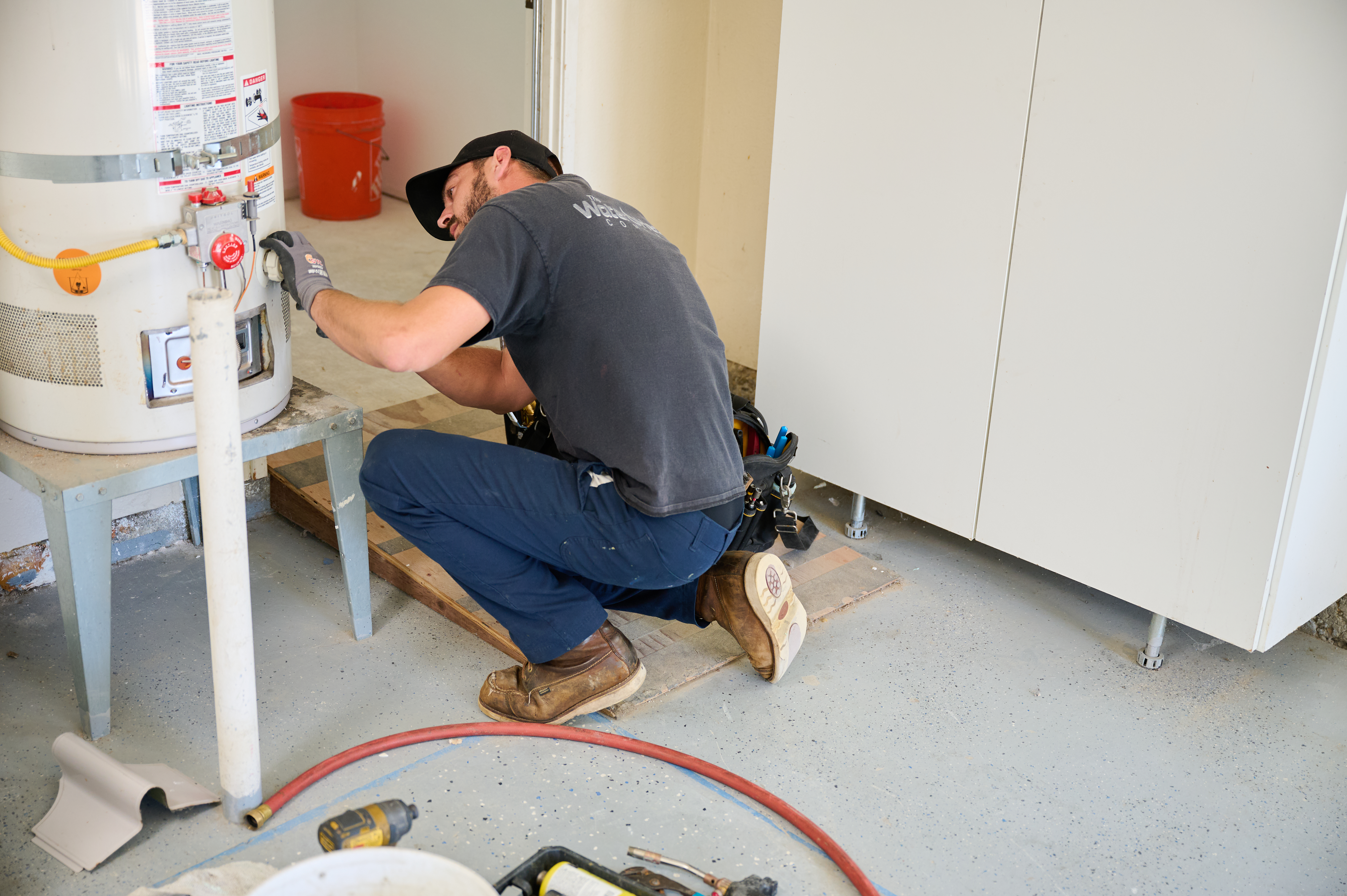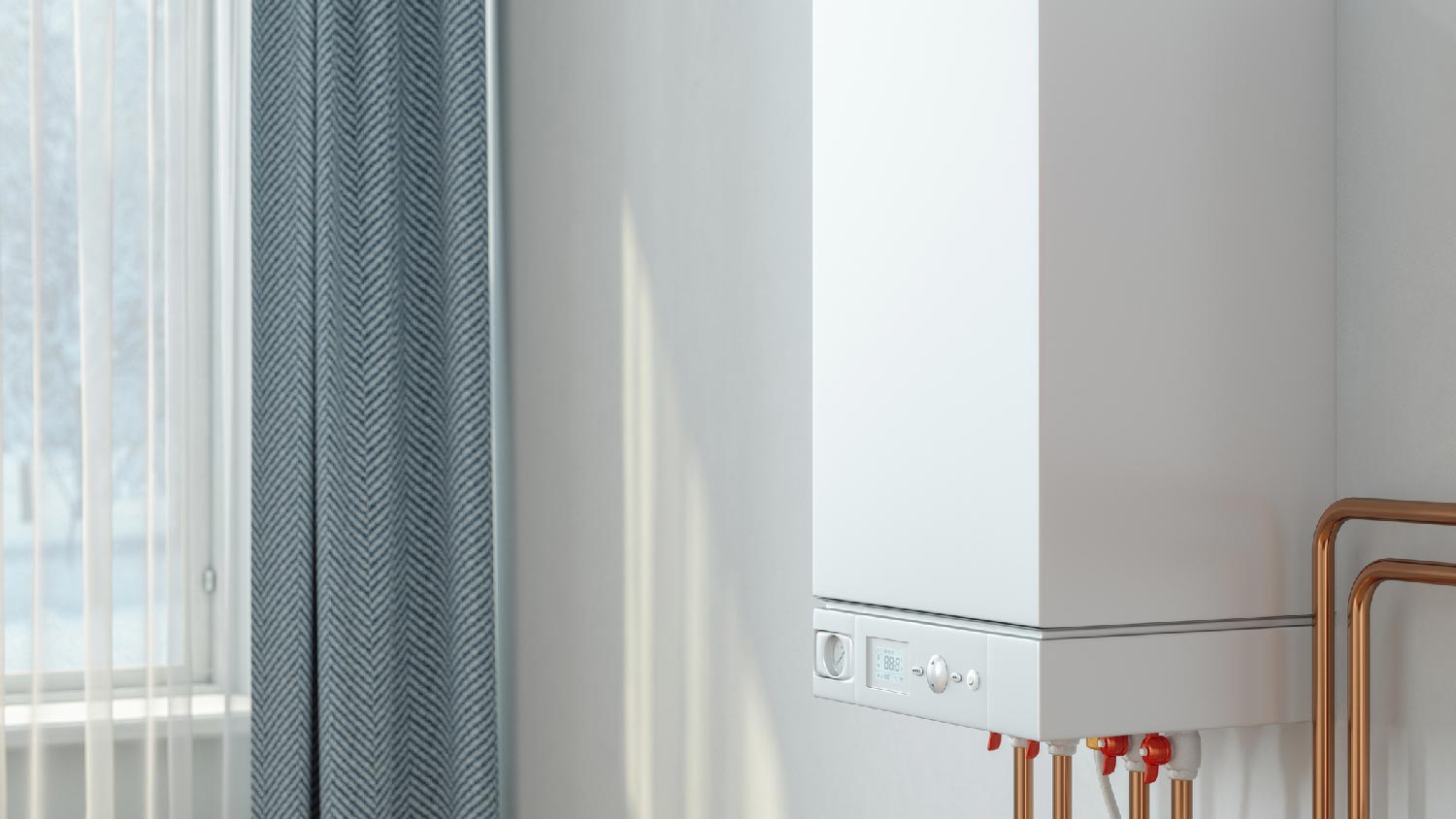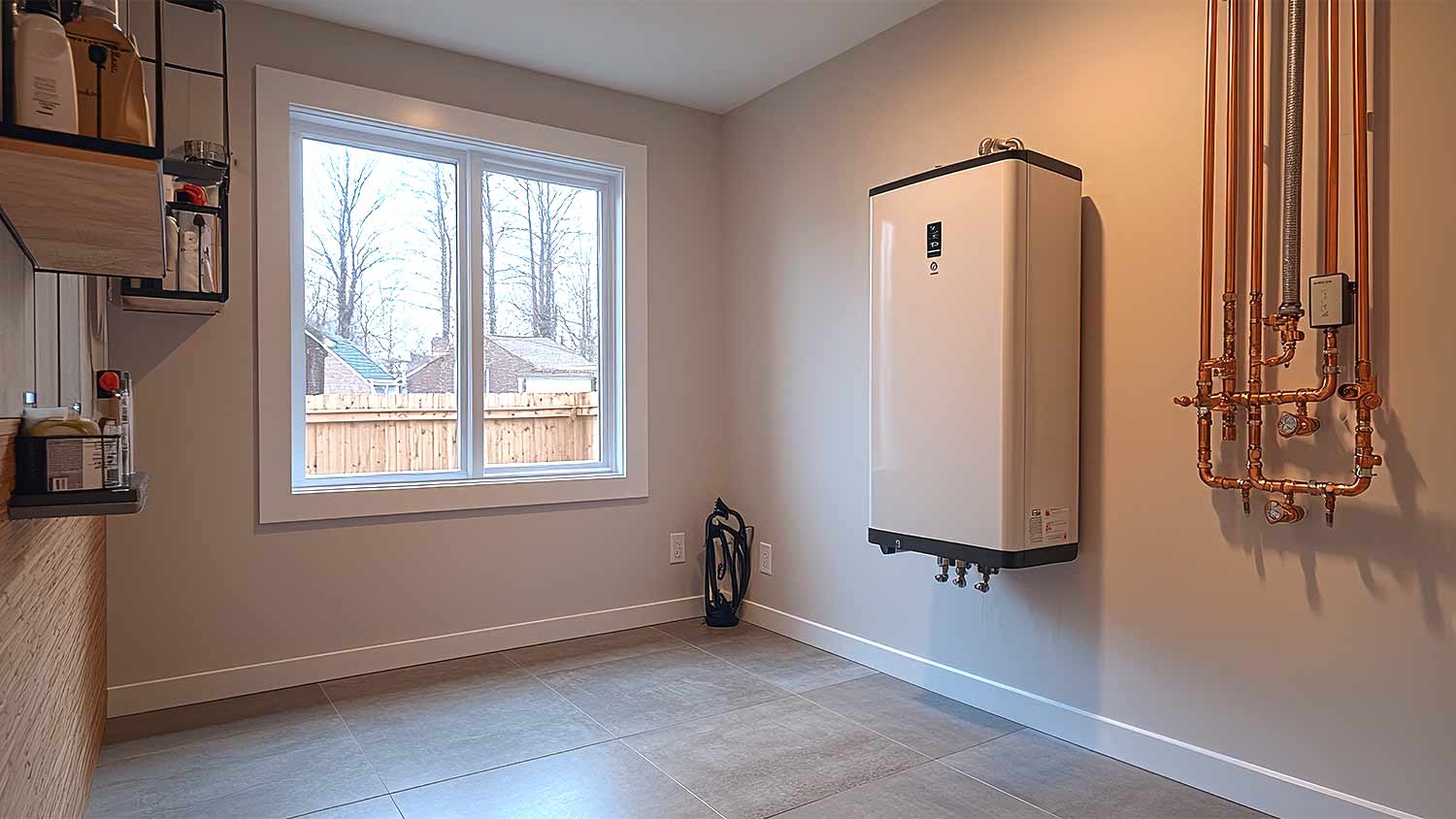
Running out of hot water too quickly? Use this water heater repair cost guide to see what a fix will cost in New York, NY.
A water heater expansion tank costs $150 to $450 on average, with a national average of $325. The total cost depends on the size and type of tank.


Water heater tanks normally last between five and 10 years.
Expansion tanks help protect your water heater and plumbing system from damage.
A thermal expansion tank costs between $40 and $200, depending on size.
A pro should do the installation, which is an additional $50 to $150.
We highly recommend inspecting your water heater annually for signs of degradation. If you spot any potential warning signs, consider contacting a local plumber.
A water heater expansion tank costs an average of $325 to install, and most people pay between $150 and $450 for the task. You may not think much about how your home heats hot water on a day-to-day basis, but reliable, on-demand hot water is essential, whether you’re taking a shower, doing the dishes, or washing your hands. Hot water heater expansion tanks can help protect your hot water heater and prevent it from exploding, as well as regulate your water pressure.
The main factors that influence the cost of installing a hot water heater expansion tank are materials—including the size and type of tank you install—and labor.
Most smaller homes will need a 2-gallon expansion tank, which costs $40 to $60. A 4-gallon expansion tank costs between $60 and $90, while 4.4- and 4.8-gallon expansion tanks range between $60 to $140. For tanks over 5 gallons, you can expect to pay $140 to $200 for the tank alone.
| Heater Size (gal) | Water Pressure (psi) | Expansion Size (gal) |
|---|---|---|
| 40–60 | 40–50 | 2 |
| 40–60 | 60–80 | 3.2 |
| 80 | 40 | 2 |
| 80 | 50–60 | 3.2 |
| 80 | 80 | 4.4 |
The standard type of expansion tank for hot water heaters is the thermal expansion tank. These tanks will run between $40 to $200 depending on the size that you need.
There are also solar water heater expansion tanks that fit solar heating systems. You can expect to pay about $110 for a 1.3-gallon solar expansion tank, while 3.2-gallon tanks are around $130.
The cost of an expansion tank ranges from $40 to $200. Most newer expansion tanks are bladder or diaphragm-type tanks, with a rubber bladder that expands and keeps the water separate from the main tank. Older tanks are often plain steel with no bladder. Smaller, two-gallon tanks tend to be less expensive than larger, four-gallon tanks.
You’ll also need to pay to get the water heater expansion tank professionally installed. This job typically costs between $50 and $150.
The cost of both parts and labor for an expansion tank replacement will depend on where you live. In general, the cost to replace an expansion tank is higher in areas with a higher cost of living—such as coastal areas and major cities. That said, you may also spend more to replace an expansion tank if you live in a remote area where:
There are fewer plumbers to choose from, meaning they may charge higher labor rates.
You may be outside a plumber’s network, meaning they may tack on a charge for the driving distance.
Shipping rates may be higher when having the tank delivered to your home.
| City | Cost Range (Including Installation) |
|---|---|
| Austin, Texas | $150–$400 |
| Boston, Massachusetts | $200–$500 |
| Chicago, Illinois | $200–$450 |
| Cincinnati, Ohio | $150–$400 |
| Denver, Colorado | $180–$450 |
| Los Angeles, California | $200–$500 |
| Las Vegas, Nevada | $170–$400 |
| Minneapolis, Minnesota | $180–$450 |
| New Orleans, Louisiana | $160–$400 |
| New York City, New York | $250–$600 |
| Orlando, Florida | $150–$400 |
| San Francisco, California | $250–$600 |
| Seattle, Washington | $200–$500 |
| Washington, D.C. | $200–$550 |
The replacement cost for an expansion tank is typically between $90 to $350, which includes labor.
Tanks usually last five to 10 years, so it’s a good idea to invest in a new one if you know your existing one is nearing the end of its lifespan. Additionally, some signs of a tank going bad to keep in mind include dripping water or low water pressure inside the tank.
If you have a water heater emergency and need a plumber out as soon as possible, be prepared to potentially spend more. Emergency plumbers cost 1.5 to 3 times as much, with evenings and weekends being slightly more expensive and holidays considerably more expensive. They may also charge more during regular hours if it means they have to delay another job to come work on your water heater immediately.

Consider some of these potential additional costs before you call a plumber.
Getting a permit helps ensure you don’t have water heater code violations. You should check with your local offices for exact costs, but water heater replacements usually require a permit that costs $100 to $1,500. You may be required to pay a similar or lower fee for an expansion tank replacement.
If you’re unsure if you need a new water heater expansion tank and want a pro to come take a look, you can expect to pay a plumber $45 to $200 per hour.
You will also need your local building department to inspect the tank after it’s installed to confirm that everything was done according to code. You will rarely have to pay anything for the initial mandatory inspection, but you might be on the hook for reinspection fees between $25 and $100 if you miss your inspection appointment or have to reschedule.
If you’re an experienced pro with extensive plumbing knowledge, you could save on the cost of labor and install a hot water heater expansion tank for $40 to $100 in most cases.
With that being said, hiring a professional for this job is usually a good idea. An improperly installed expansion tank can cause leaks, pipe bursts, and other issues, including damage to your water heater and excessive water pressure. For the large majority of people, it’s best to get in touch with a local water heater repair service to have the work done professionally. Flex your DIY muscles with things like fixing a leaky faucet or clearing drain clogs, instead.
While attempting a DIY job to save money may be tempting, it’s better to hire a plumber to get it done instead. Installation requires thorough knowledge of water heaters, and making a mistake could be costly and dangerous.
On the other hand, you may save money during the process by using the following tips:
Buy the unit yourself: Purchase the materials beforehand to avoid paying upcharges added by your plumber. Just make sure you choose the right size water heater expansion tank for your home and equipment.
Consider the warranty: Make sure you’re buying from a reputable store and check if warranties are included before making a purchase. Warranties can save you money on repairs and replacements over time.
Hire a certified plumber: It will cost more upfront to hire a certified plumber to install your expansion tank, but they’re less likely to make a mistake than an unlicensed professional. Ultimately, the upfront investment could save you on repairs over time.
Upgrade to a tankless water heater: Upgrading to a tankless water heater means you don’t have to install an expansion tank at all, so you could save money on the materials and labor, as well as the boosted efficiency over time.
Choosing the right water heater expansion tank for your water heater size, water pressure, and the number of people in your home is crucial if you want the tank to do its job properly. There are a few things you need to consider to get the right size expansion tank.
Water heater capacity: The larger your water heater tank is, the more water it will heat at once, which means the more the water will expand. Larger expansion tanks are necessary for larger water heater tanks.
Water heater pressure: Water heaters produce a specific water pressure when they heat water. Your expansion tank should be rated to accept that pressure so that it can regulate the pressure in your pipes.
Demand for hot water: Homes with a larger demand for hot water need larger tanks to keep up with the demand.
The table below should serve as a quick sizing guide for your water heater expansion tank.
| Tank Size | Pressure at Meter | Expansion Size |
|---|---|---|
| 40 gallons | 40 | 2-gallon |
| 40 gallons | 60 | 2-gallon |
| 40 gallons | 80 | 3-gallon |
| 60 gallons | 40 | 2-gallon |
| 60 gallons | 60 | 3-gallon |
| 60 gallons | 80 | 3-gallon |
| 80 gallons | 40 | 2-gallon |
| 80 gallons | 60 | 3-gallon |
| 80 gallons | 80 | 4- or 5-gallon |
When trying to find the best water heater installation company near you, it’s a good idea to get quotes from at least three, if not more, different contractors. This will encourage pros to submit more competitive estimates, and you can choose a contractor that best meets all your needs, including low price, quick timeline, and glowing customer reviews.
During the quote process (and again when the chosen contractor shows up to install the water heater expansion tank, you can consider a few questions to help make your decision and ensure you’re prepared for the service. Here are the questions we recommend asking your installer:
Is your company insured, and is the contractor who will be doing the installation licensed?
What size water heater expansion tank do you recommend for my home? Is there a specific brand you suggest I go with?
Does this job require a permit? If it does, will your company handle obtaining that permit, and is that price reflected in the quote?
Does the water heater expansion tank you’re installing come with a warranty? If so, what are the details? Is your labor also backed by any work guarantee?
How soon can you begin the installation, and how long will it take?
Is there anything I need to do to prepare for the installation?
Are there any other water heater components I should consider repairing or replacing during this installation, based on your inspection? How much will those cost?
Do you charge a flat rate or on an hourly basis?
Can you share recent client testimonials for similar jobs?
What kind of maintenance does a water heater expansion tank require? Is this the type of water heater maintenance I can handle on my own? If not, does your company provide this kind of service?
Home is the most important place on earth, which is why Angi has helped more than 150 million homeowners transform their houses into homes they adore. To help homeowners with their next project, Angi provides readers with the most accurate cost data and upholds strict editorial standards. We extensively research project costs to develop the pricing data you see, so you can make the best decisions for you and your home. We rely on reputable sources, including the U.S. Bureau of Labor Statistics, academic journals, market studies, and interviews with industry experts—all to ensure our prices reflect real-world projects.
Want to help us improve our cost data? Send us a recent project quote to [email protected]. Quotes and personal information will not be shared publicly.
From average costs to expert advice, get all the answers you need to get your job done.

Running out of hot water too quickly? Use this water heater repair cost guide to see what a fix will cost in New York, NY.

Tankless water heater costs in New York, NY, depend on the size of your water heater, location, fuel type, and more. Keep reading to calculate your expenses.

A water heater flush costs $160 on average but can vary based on the unit size, type, labor, location, and more. Keep reading to learn how much you could pay.

If your gas hot water heater isn't working, you want to fix the issue quickly to prevent safety risks and major damage. Here's how to troubleshoot.

Are you ready to replace your home's water heater? Learn how to replace a gas water heater and whether it's best to DIY or call a pro.

The number of people, flow rate, and water temperature in your home will help you calculate what size tankless water heater you need. This guide walks you through it.